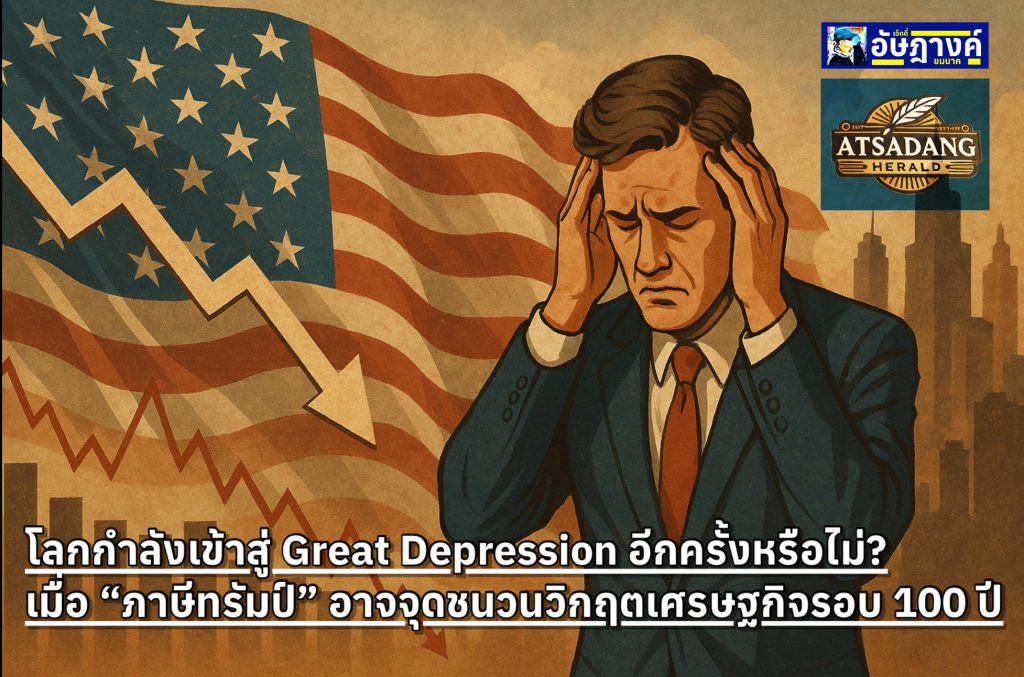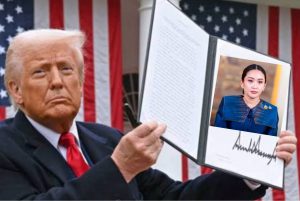
โลกกำลังเข้าสู่ Great Depression อีกครั้งหรือไม่?
เมื่อ “ภาษีทรัมป์” อาจจุดชนวนวิกฤตเศรษฐกิจรอบ 100 ปี
#อัษฎางค์ยมนาค
หลังจากอดีตประธานาธิบดีสหรัฐฯ โดนัลด์ ทรัมป์ ประกาศใช้ กำแพงภาษีครอบคลุมทั่วโลก ผ่านกฎหมาย Reciprocal Tariff Act ซึ่งตั้งเป้าเก็บภาษีนำเข้าจากทุกประเทศ 10% และจะจัดเก็บภาษีตอบโต้กับประเทศที่สหรัฐฯ ขาดดุลการค้าอย่างมาก เช่น ไทย จีน เม็กซิโก เยอรมนี ญี่ปุ่น ฯลฯ
คำถามใหญ่คือ…
นี่อาจเป็นสัญญาณของ Great Depression ยุคใหม่หรือไม่?
ย้อนอดีตให้จำ:
ในปี 1930 สหรัฐฯ เคยออกกฎหมายภาษีลักษณะคล้ายกันชื่อว่า Smoot-Hawley Tariff Act
ผลที่เกิดขึ้นคือ:
• โลกตอบโต้ด้วยมาตรการทางภาษีเช่นกัน
• การค้าโลกหดตัว ตลาดหุ้นสหรัฐฯ ร่วง 89% ภายใน 3 ปี
• ใช้เวลาถึง 25 ปีกว่าดัชนีจะกลับมาจุดเดิม
เหตุการณ์นี้ถูกบันทึกในประวัติศาสตร์ว่า Great Depression
แล้วเหตุการณ์วันนี้ เสี่ยงจะซ้ำรอยหรือไม่?
คำตอบคือ: “มีความเสี่ยง แต่ยังไม่ถึงจุดวิกฤต”
สามเหตุผลสำคัญที่ยังแตกต่างจากอดีต:
1) โลกมีระบบรับมือที่ทันสมัยกว่าเดิม
วันนี้มีองค์กรระดับโลก เช่น IMF, WTO, G20 ที่ช่วยผ่อนคลายผลกระทบทางการค้าและการเงินได้รวดเร็วกว่าในอดีต
2) นโยบายการเงิน-การคลัง มีเครื่องมือหลากหลาย
เช่น QE, ดอกเบี้ยต่ำ, แพ็กเกจอัดฉีดเศรษฐกิจ และการประกันความมั่นคงของสถาบันการเงิน
3) โครงสร้างเศรษฐกิจโลกหลากหลายและเชื่อมโยงมากขึ้น
ไม่ได้ผูกกับสหรัฐฯ ฝ่ายเดียว ประเทศอื่นอย่างจีน อินเดีย อาเซียน กลายเป็นศูนย์กลางใหม่ที่สามารถรักษาสมดุลได้ในระดับหนึ่ง
สำหรับประเทศไทย ควรรับมืออย่างไร?
• ใช้จุดแข็งของไทยในเวทีภูมิรัฐศาสตร์
เช่น การเป็นศูนย์กลางของอาเซียน การเข้าร่วม RCEP และ IPEF ควรใช้เป็นเครื่องต่อรองทั้งด้านการค้าและความมั่นคง
• ขยายตลาดส่งออกใหม่ หลีกเลี่ยงการพึ่งตลาดสหรัฐฯ เพียงลำพัง
เช่น ตลาดตะวันออกกลาง แอฟริกา เอเชียใต้ และอเมริกาใต้
• สร้างแบรนด์ไทยให้มีมูลค่าสูง แข่งขันด้วยคุณค่า ไม่ใช่แค่ “ราคาถูก”
เช่น การเพิ่มคุณภาพสินค้า พัฒนาแบรนด์ระดับโลก และเน้นมาตรฐานสากล
• เตรียมแผนเศรษฐกิจภายในประเทศ
กระตุ้นเศรษฐกิจภาคครัวเรือน พัฒนาแรงงาน พึ่งพาการบริโภคในประเทศมากขึ้น
สรุป:
มาตรการภาษีของสหรัฐฯ ในปีนี้ อาจเป็นจุดเริ่มต้นของความปั่นป่วนครั้งใหม่ของระบบเศรษฐกิจโลก แม้ยังไม่ถึงขั้น “Great Depression” แต่ประเทศไทยและภาคธุรกิจจำเป็นต้อง “ตื่นตัว” และ “เตรียมพร้อม” เพื่อพลิกวิกฤตให้เป็นโอกาส และรักษาเสถียรภาพของประเทศในระยะยาว
Is the World Heading Toward Another Great Depression?
As “Trump’s Tariffs” Could Ignite a 100-Year Economic Crisis
by Eddie Atsadāng Yommanāk
Following the announcement by former U.S. President Donald Trump to impose blanket tariffs on all imports under the new Reciprocal Tariff Act, concerns have begun to rise globally. This law aims to impose a 10% baseline tariff on imports from all countries and retaliatory tariffs on countries with which the U.S. runs significant trade deficits—such as Thailand, China, Mexico, Germany, Japan, and more.
The big question is:
Could this be the beginning of a new Great Depression?
A Look Back in History:
In 1930, the U.S. passed a similar tariff law—the Smoot-Hawley Tariff Act.
The consequences were severe:
• Countries responded with retaliatory tariffs.
• Global trade collapsed.
• The U.S. stock market plummeted by 89% within three years.
• It took 25 years for the market to return to its previous peak.
That period came to be known as the Great Depression.
Could today’s situation repeat history?
The answer: “There is risk—but we’re not at a crisis point yet.”
Here are three key differences from the past:
1. Modern Global Safety Nets Exist
Organizations like the IMF, WTO, and G20 can intervene quickly to ease economic and trade disruptions, unlike in the 1930s.
2. More Advanced Monetary and Fiscal Tools
Today, central banks and governments can use mechanisms like quantitative easing (QE), low interest rates, stimulus packages, and financial safeguards to mitigate downturns.
3. A More Diverse, Multi-Polar Economic Structure
The global economy no longer relies solely on the U.S.
Countries like China, India, and ASEAN nations have become economic power centers that help balance global trade dynamics.
How Should Thailand Respond?
• Leverage Thailand’s Geopolitical Strengths
As the center of ASEAN and a member of RCEP and IPEF, Thailand should use these positions strategically in trade and security negotiations.
• Diversify Export Markets
Avoid over-reliance on the U.S. by expanding trade to regions such as the Middle East, Africa, South Asia, and Latin America.
• Build Stronger Thai Brands with Global Value
Focus on quality over price, enhance product standards, and position Thai products as premium and internationally competitive.
• Strengthen Domestic Economic Plans
Boost household spending, improve workforce skills, and foster internal consumption to reduce vulnerability from external shocks.
In Conclusion:
The U.S. tariff measures may not yet trigger a full-scale Great Depression,
but they certainly represent a new wave of global economic instability.
Thailand must stay alert and prepare accordingly—
to turn potential crisis into opportunity,
and safeguard its economic resilience in the long term.



